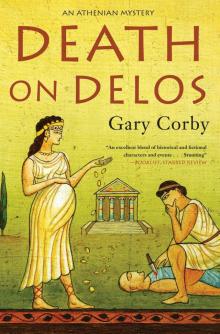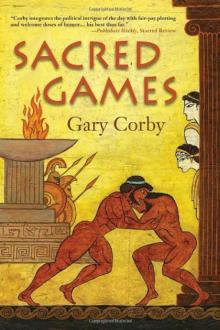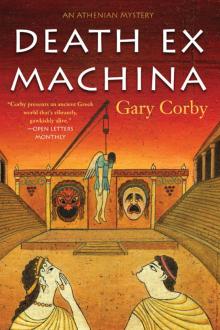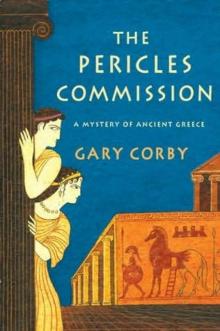- Home
- Gary Corby
The Singer from Memphis Page 2
The Singer from Memphis Read online
Page 2
I took the scroll and sat down on the couch opposite Pericles’s desk. It was the comfortable old dining couch that had been placed to catch the sun that streamed through the window overlooking the courtyard. I sat without being invited, as I always did when I visited, and Pericles took no notice. I was struck by the easy familiarity of it all. How many years had I sat in this room, from time to time? Five now, I realized, counting back. Five years since my first commission.
The first time I sat in this room, I had been half-terrified. Now familiarity—and Pericles’s habit of landing me in the raw end of every crisis—had reduced me to this assumption that I was free to take my comfort among the rich and powerful, though I myself was neither.
The scroll had been written in a firm hand, in good Greek. The message said:
Inaros son of Psamtik greets the Athenians and says this: the war against the Persian proceeds well. Together the Egyptians and the Athenians have won a great victory. Most of Lower Egypt lies in our hands.
The enemy has retreated to their stronghold within Memphis. It is their final chance.
There was more, but I looked up at Pericles. I said, “This is a status report. Who is Inaros?”
“The leader of the rebels,” Pericles said. “Inaros inspired the uprising. He raised the native army. If it weren’t for him, there would be no rebellion. Oh, and he’s a Prince of Libya.”
“Libya?” I said. “I thought the rebels were Egyptian.”
“They are. Inaros is a Libyan prince who claims to be a descendant of the last Pharaoh.”
“That sounds doubtful,” I said. “Is it true?”
“Does it matter?” Pericles countered pragmatically. “The man is causing trouble for the Persians, and that’s good enough for me. Read the next part. It concerns you.”
Inaros says this: the battle for Memphis will be a formidable task. In the south of the city lies the White Fort. It is almost impregnable. The Persian holds this fort with all the strength that remains to him.
The fort can be reduced by starvation. But that takes months or years, and the Great King of the Persians will certainly send another army before then. The fort can be taken by assault, in a glorious battle. Such enterprises are risky, as all men know.
There is a way to reduce the Persian’s hold without a great battle. Send me an agent, a man of cunning and resource, someone I can trust, as I could trust no Egyptian in this matter. Do this, and Memphis shall fall, and the Persian shall be driven from Egypt.
Thus speaks Inaros to the Athenians.
That was the end of the message. I put it down and said, “So Inaros wants an agent. What does he want the agent to do?”
“He doesn’t say,” Pericles said.
“I noticed that,” I said unhappily. I had little doubt who Pericles would nominate to be this agent of cunning and resource.
“Obviously the Prince of Libya wants you to represent him in some delicate matter,” Pericles said.
Inaros had used the same word we would for a commercial agent, or someone delegated to act on another’s behalf. It could mean anything from negotiating to buy a house, to arranging to have someone killed. There was no way to know. I also didn’t like that part about Inaros not being able to trust an Egyptian. I asked Pericles what it meant.
“I don’t know,” he admitted. “However there’s something else you need to hear. We’ve had word that another agent has been sent to Egypt. The word is that this man is a Hellene, but a Hellene who works for the Persians.”
This job was getting worse every time Pericles opened his mouth. I said, “So just as Inaros has asked for an agent from us, the Persians are sending their own man.”
Pericles nodded. “Whatever’s happening down there, it’s important.”
“How did you hear of this?” I asked.
“A source from within the Persian Court,” Pericles said, somewhat evasively. “We have friends there—visitors to Susa and the Great Court—sometimes they hear things. One of them wrote to us with this news.”
“There’s a traitor among the Hellenes then,” I said.
“Not necessarily.” Pericles shook his head. “Many Hellenes are legitimately members of the Empire. Those who live in cities on the far coast of the Aegean, for example.”
“Do we know who the agent is?” I asked. “His name? His city?”
“No.”
I suddenly caught the drift of Pericles’s argument.
“You think this Herodotus is the Persian agent!” I exclaimed.
“He might be,” Pericles said. “Think about it, Nicolaos. Herodotus comes from Halicarnassus. It’s a city on the other side of the Aegean Sea. It’s under Persian sway; he could hold Persian sympathies. Consider that at the moment he arrives in Athens, on his way to Egypt, we hear of an enemy agent dispatched to that very same destination.”
“It could be a coincidence,” I said. “Many traders travel to Egypt.”
“Yes, that’s why I deliberately sought out this man Herodotus, to judge for myself, when I heard he was in Athens and enquiring about Egypt.”
“Then the coincidence of you two meeting—”
“Was no coincidence,” Pericles agreed. “I arranged for a friend to invite Herodotus to a symposium that I would be attending. I made a point of speaking to him. The moment he said he needed an escort, I suggested you. Thus if Herodotus is an agent of the Persians, I’ve planted on him an agent of the Hellenes.” Pericles smiled a sneaky smile. “As I said before, it was too good an opportunity to pass up.”
This was typical Periclean convoluted thinking. Pericles thought he was smarter than everyone else. The fact that he was right did nothing to make his devious schemes any less worrying for the people who had to execute them. If Herodotus was an agent of the Persians, then Diotima and I would be in mortal danger every moment we were with him.
“This is important, Nicolaos,” Pericles said. “All eyes are turning to Egypt. All armies, all strategies are concentrating there. There’s certain to be a major decision in that country. I don’t know what it will be—there are too many factors, too many chancy options—but whatever happens will change the future of every city and every nation of civilization.”
Pericles’s words strangely echoed Herodotus himself when he had said he wanted to go to Egypt to record the great deeds of men.
“Your mission, Nicolaos, is to go to Egypt, talk to this Inaros, do whatever he wants, within reason, and report back to me on what is happening down there.”
“What of Herodotus?” I asked. “What if he proves to be the Persian spy?”
“Then kill him,” Pericles said.
All at Sea
I accepted the commission from Herodotus. As the fee for my services, I asked for ten drachmae a day, plus expenses. It was twice what I thought I could get. After all, the average workman only earns one drachma a day.
I expected Herodotus to haggle with me. Instead, he agreed instantly to my outrageous demand and told me to find passage to Egypt at once. He said he was worried that something exciting might happen before we got there.
I was more worried that something exciting might happen after we arrived, but I had little choice in the matter since I had Pericles’s secret commission to enact.
As I walked down to the docks at Piraeus, I thought about Herodotus. Money was no object for him. Either Herodotus was a wealthy man, or he was backed by someone with a great deal of coin; such as the Persian Empire. It was something to think about. In either case, for the sort of money my new client was paying, he had every reason to expect perfect service. I went to find us a boat.
Cargo ships leave for Egypt every third or fourth day. It’s one of the most profitable trade routes for luxury items. The Egyptians send us papyrus and jewelry. We send them ceramics and amphorae of wine. The big, fat traders were prepared to take a passenger or three. The
problem was, they would all be far too slow. Every trader followed the coastal route. They would spend interminable days haggling at every port of call.
Luckily I had an answer. I arranged our passage to Egypt with my friend Captain Kordax. Kordax was a retired navy captain who had reluctantly given up command of a warship, and then instantly created his own shipping line. Four of his five boats were slow tubs designed to carry grain to the islands. There was always money to be made in that. The fifth was the pride of his small fleet. It was a courier boat that he commanded personally. Kordax hired it to wealthy businessmen, state emissaries, or other important men who needed to be somewhere else, fast.
Friendship didn’t prevent the good Captain from charging me a fortune. I didn’t mind, because Herodotus was paying, and because we’d chartered the entire boat for our own use. What Kordax asked seemed a fair price for a sleek private ship.
Next morning at dawn, Herodotus, Diotima and I stepped onto the deck of Dolphin, so named, Kordax explained, because his ship was as fast and clever as that remarkable creature. As the boat gently glided away from the Piraeus docks, we left behind a loudly protesting Socrates. I wasn’t willing to take my little brother into a war, and in any case our father absolutely forbade it. Nor was Father thrilled that I was taking my wife with me, but there is a long-standing tradition of businessmen taking their wives with them on long journeys, and as far as the world was concerned business was all this trip was about.
We weren’t the only departure. Dawn is the usual time for boats to make way. The moment the sun rose, every boat in the harbor took off almost simultaneously. Around us were small merchantmen, large cargo carriers, a handful of navy triremes, and more fishing boats than I could count. Dolphin was more nimble than the triremes and faster than every other boat. She soon surged ahead to lead the oddly assorted flotilla out of the harbor and into the Aegean Sea.
As the crew rowed, Herodotus, Diotima and I stood at the back of the boat—out of the way of the steersman—to watch Athens fall away. The Acropolis stood like a mighty champion above the city.
Kordax came to the back of the boat to talk to his client about the voyage. This was the first time Kordax and Herodotus had met. Our captain was courteous. Herodotus in his turn made Kordax a friend for life by saying he would love to hear every detail of how Dolphin was constructed.
Dolphin would need five days to reach Egypt, Kordax said to us. The first three would be spent island hopping from Piraeus to Crete. It was a simple, easy run from one island to the next. As Kordax explained it, this was the perfect combination for a sailor who wanted to travel fast but safely. The water was smooth on this leg and we would never be far from a coastline.
Then he warned us there would be a very long day from Crete to the coastline of Africa. We would leave Crete before dawn and arrive at night. Kordax said that he would delay in Crete until the wind favored us, so that he could raise the sail for speed, and so that if there was an emergency the crew would not be too exhausted to handle it.
Dolphin was a light ship compared to the wide, spacious, but slow cargo ships beloved by traders. In shape she was more like the sleek triremes of the navy. Kordax had copied her design from the ships he used to command. Yet Dolphin was barely a third the length of a trireme, and she carried no battering ram at the front, as a warship would.
Navy triremes are crewed by two hundred men, a hundred and seventy of them rowers. Dolphin was served by forty men and three officers. All forty looked to be experienced, hand-picked men. Certainly their skins had been weathered by the sea in that unmistakable way. These men could row through the day without flagging, or judge the wind and set a sail, or repair anything on board that was broken. Kordax paid high wages and he got the best.
We sheltered the first night at Siphnos. It was a small, pleasant island with a bay and a sandy beach. There was no dockyard. The local fisher folk had hauled their craft onto the sands for the night. After only a day of running there was no need to beach our boat for supplies—we were only stopped because to carry on through the night was too dangerous—so Kordax anchored Dolphin a safe distance from shore.
The night was warm. I suggested to Diotima that we go for a swim.
“But Nico, I don’t know how to swim,” Diotima said, matter-of-fact.
“You can’t swim?” I said to my wife, astounded. We’d been married almost two years, and I’d never realized.
Yet now that I thought about it, it was obvious. Athenian girls run races on land, and they paddle in the nearby river. But I’d never, ever seen any father take his daughter to the beach, to teach her to swim. Of course Diotima couldn’t swim. No one had ever taught her.
I resolved to teach my wife to swim at the earliest possible instant. But falling dusk in a foreign bay that neither of us knew didn’t seem the time or place. We spent the evening eating the ship’s rations and watching people move about in the distant town. Then we slept on the deck—the only place possible on a boat—upon soft pallets under the stars, among the snoring sailors.
Throughout the first day and the next I kept a close eye on Herodotus. I wanted to see if he acted like a secret agent. The only problem was, I wasn’t sure how a secret agent acted on a boat. When I mentioned this difficulty to Diotima, she pointed out that I was a secret agent and I was on a boat. Therefore if Herodotus acted like me then he must be guilty.
Herodotus did act like me, but only because we were both bored. I thought about offering to help row, but the men at the oars were professionals and they wouldn’t welcome an amateur, no matter how well-meaning. Herodotus dealt with the tedium by quizzing the sailors about any stories they might have heard from distant lands. He sat beside the rowers with a brush in his hand, a jar of ink by his side, and a scroll in his lap on which he kept his notes. That scroll was like a sponge. No man could say a word that would not end up on its paper, if Herodotus was there to hear it. The sailors soon became sick of this—it’s hard to talk and row in time to a steady beat. They began to ignore him.
Herodotus moved his inquisitive attention to Diotima and me. I still didn’t know if he was a secret agent, but he would have made a fine detective: he never stopped asking questions.
Somehow Herodotus knew that Diotima and I had been to Ionia, a province of Asia Minor. What was more disconcerting was that he knew we had been in Magnesia, to the court of Themistocles, at the time when that great man died. I didn’t recall ever mentioning that to Herodotus, and I was sure Diotima had said nothing. Our presence had been public knowledge, so perhaps that explained it, but it seemed odd to me that he knew such a detail.
Herodotus proceeded to ask us questions about Themistocles. We were able to fend off almost every sensitive issue, since we had only met Themistocles at the end of his life.
“How did he die?” Herodotus asked. He held the brush poised over his scroll and looked up at us expectantly.
The answer to that question was a state secret. I turned to Diotima. Diotima turned to me. We had both sworn never to reveal the truth of those terrible days. But Herodotus was waiting. We had to say something.
I said, “He died of an illness. It was natural causes.”
The explanation might have held, except that at the very same instant Diotima said, “It was suicide. He drank bull’s blood.”
Herodotus looked from one to the other of us in surprise. “Surely it must be one or the other.”
“It was both,” I answered, thinking quickly. “When Themistocles learned he was dying of natural causes, he drank bull’s blood to end it all.”
“I see.” Herodotus said doubtfully. “I didn’t realize bull’s blood was poisonous.”
“Oh, it is,” Diotima said with a straight face. “I thought everyone knew that.”
“Thank you,” Herodotus said. He scribbled notes.
After that we resolved to avoid Herodotus whenever he had his scroll open.
It was mid-afternoon of the second day when we arrived at Thera, an oddly shaped island that was incredibly beautiful. The bay was surprisingly deep. Kordax told me that no one had ever succeeded in swimming to the bottom. Yet the water was a warm translucent blue, and because the high land curved around on all sides, almost in a perfect circle, it seemed more like a giant pond than a part of the sea.
Diotima was entranced. She said to me, “Nico, when this mission is over, we’re coming back here for a holiday.”
“Sure,” I agreed at once.
Herodotus begged Kordax to let us off. Herodotus was particularly keen to talk to the locals. “Did you know that Thera was once a colony of Sparta?” he said.
I didn’t. Nor did I care.
Since Herodotus was paying for the trip, his request amounted to an order. Kordax took Dolphin in close enough to the sands that we could all spend the afternoon off the boat.
The deck hands warned me not to expect much in the way of excitement in town. Nothing ever happened on Thera. But that didn’t prevent them from wanting to hit the local tavern.
Kordax made a stern speech to the men. He promised to leave behind any man who was too drunk to row next morning, then gave all but a rump crew permission to go ashore. The sailors leapt overboard and waded to land.
Diotima jumped into my arms while I stood in chest-deep water. All day I had watched her anxiously, knowing now that if she fell off the boat she would sink. Every time she went near the side, my heart had leapt to my mouth and I had grabbed her arm. My solicitous attention had finally exasperated her, and the men laughed at me, but I didn’t care. I wasn’t going to lose my wife to Poseidon’s depths.
Herodotus invited us to go with him to interview the locals for his book. We declined. Herodotus was safe enough here, and I could imagine better ways to spend our short time off ship than to irritate farmers and fishermen with endless questions.

 The Singer from Memphis
The Singer from Memphis Death on Delos
Death on Delos Sacred Games
Sacred Games The Ionia Sanction
The Ionia Sanction Death Ex Machina
Death Ex Machina The Pericles Commission
The Pericles Commission